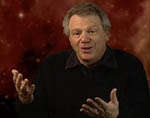Description
|
AUDIO:
Dr. Robert Kirshner: So that we have dark matter on one hand, which is gravitating stuff slowing down the expansion of the Universe, and dark energy on the other. And the funny thing is that ordinary matter, the stuff we're made of, seems to be just almost unimportant in this picture. We're just the frosting on the cake. The real cake is made of dark matter and dark energy. There's a kind of tug of war between these two things. That the dark matter is trying to slow things down. It has ordinary gravity of the kind you would think stuff ought to. Whereas the dark energy has the opposite affect of making things speed up, of making the expansion go faster over time.
We've given them these sort of flippant names. The curious thing is we don't know what either one of them is. We do not know what the dark matter is really made of. There's been no laboratory measurement of the dark matter. And we don't know what the dark energy is either.
We know what it does. We know that it makes things speed up. We measure that from looking at distant supernovae. And they seem to be a little farther away than you would expect. Which means that during the time that the light was coming from the explosion to you, the Universe expanded a little extra. And this extra expansion, this speeding up of cosmic expansion, is what we attribute to the properties of the dark energy.
The thing that makes me think that we're not on the wrong track and that this really is real, is not just that we've been measuring the supernovae better and better over time, or getting more and more of them, but that there are other directions of approach to the problem.
So people have been looking at how galaxies cluster, from big galaxy surveys. And that turns out to tell you something about how the dark matter and the dark energy have been competing over time.
I think, in the long run, we'll understand more about what happened in the big bang, not less. And that there's no kind of barrier that says "Beyond here, human beings will never understand anything." So, I think, that we're doing okay with our limited little brains. We're getting these little clues of starlight and we're puzzling out what they mean.
We've got this picture of an expanding Universe. We're able to build instruments to see way back in the past. We're putting all that stuff together to make a picture of a Universe which is very surprising. Starting at a big bang fourteen billion years ago, accelerating now, full of this darkness, the dark energy and the dark matter, and even though we don't understand what those things are today, it doesn't mean we won't understand ten or twenty or thirty or fifty years from now. We may understand very well what those things are and we'll be on to understanding a kind of new level of mystery about the Universe.
VIDEO:
This video shows Dr. Robert Kirshner talking about dark matter and dark energy. While taking about supernovae, a images are shown of distant galaxies before and after supernovae. The images show that the supernovae are a little farther away than expecting, showing the extra expansion during the explosion. While taking about galaxy clusters, Chandra x-ray images of galaxy clusters are shown.


